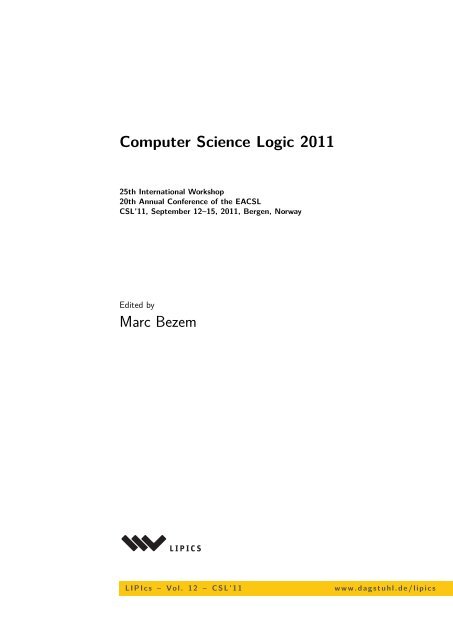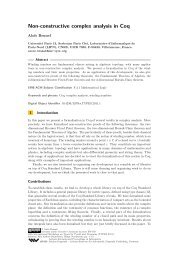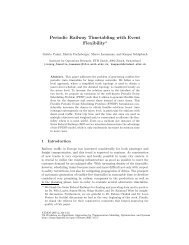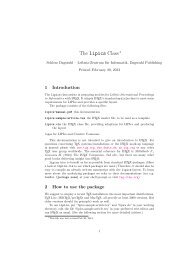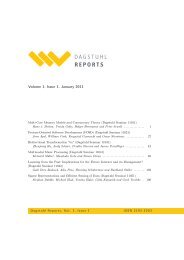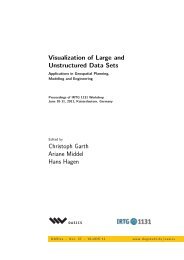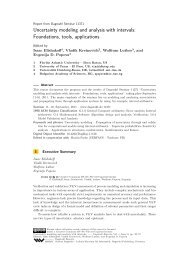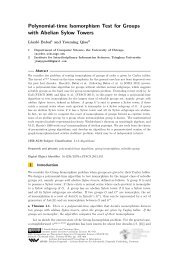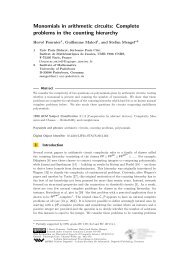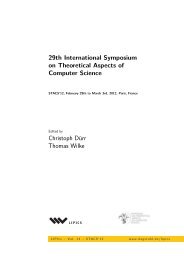The Ackermann Award 2011 - DROPS - Schloss Dagstuhl
The Ackermann Award 2011 - DROPS - Schloss Dagstuhl
The Ackermann Award 2011 - DROPS - Schloss Dagstuhl
You also want an ePaper? Increase the reach of your titles
YUMPU automatically turns print PDFs into web optimized ePapers that Google loves.
Computer Science Logic <strong>2011</strong><br />
25th International Workshop<br />
20th Annual Conference of the EACSL<br />
CSL’11, September 12–15, <strong>2011</strong>, Bergen, Norway<br />
Edited by<br />
Marc Bezem<br />
L I P I c s – Vo l . 1 2 – C S L ’ 1 1 w w w . d a g s t u h l . d e / l i p i c s
Editor<br />
Marc Bezem<br />
Department of Informatics<br />
University of Bergen<br />
bezem@ii.uib.no<br />
ACM Classification 1998<br />
A.0 Conference Proceedings; D. Software; F. <strong>The</strong>ory of Computation;<br />
G.2.2 Graph <strong>The</strong>ory; G.3 Probability and Statistics; I.2 Artificial Intelligence<br />
ISBN 978-3-939897-32-3<br />
Published online and open access by<br />
<strong>Schloss</strong> <strong>Dagstuhl</strong> – Leibniz-Zentrum für Informatik GmbH, <strong>Dagstuhl</strong> Publishing, Saarbrücken/Wadern,<br />
Germany. Online available at http://www.dagstuhl.de/dagpub/978-3-939897-32-3.<br />
Publication date<br />
September, <strong>2011</strong><br />
Bibliographic information published by the Deutsche Nationalbibliothek<br />
<strong>The</strong> Deutsche Nationalbibliothek lists this publication in the Deutsche Nationalbibliografie; detailed<br />
bibliographic data are available in the Internet at http://dnb.d-nb.de.<br />
License<br />
<strong>The</strong>se works are licensed under a Creative Commons Attribution-NonCommercial-NoDerivs (BY-NC-ND)<br />
or Attribution-NoDerivs (BY-ND) 3.0 Unported license:<br />
BY-NC-ND: http://creativecommons.org/licenses/by-nc-nd/3.0/legalcode<br />
BY-ND: http://creativecommons.org/licenses/by-nd/3.0/legalcode<br />
In brief, these licenses authorize each and everybody to share (to copy, distribute and transmit) the works<br />
under the following conditions, without impairing or restricting the authors’ moral rights:<br />
Attribution (BY-NC-ND, BY-ND): <strong>The</strong> work must be attributed to its authors.<br />
No derivation (BY-NC-ND, BY-ND): It is not allowed to alter or transform this work.<br />
Noncommercial (BY-NC-ND): <strong>The</strong> work may not be used for commercial purposes.<br />
<strong>The</strong> copyright is retained by the corresponding authors.<br />
Digital Object Identifier: 10.4230/LIPIcs.CSL.<strong>2011</strong>.i<br />
ISBN 978-3-939897-32-3 ISSN 1868-8969 www.dagstuhl.de/lipics
LIPIcs – Leibniz International Proceedings in Informatics<br />
LIPIcs is a series of high-quality conference proceedings across all fields in informatics. LIPIcs volumes<br />
are published according to the principle of Open Access, i.e., they are available online and free of charge.<br />
Editorial Board<br />
Susanne Albers (Humboldt University Berlin)<br />
Chris Hankin (Imperial College London)<br />
Deepak Kapur (University of New Mexico)<br />
Michael Mitzenmacher (Harvard University)<br />
Madhavan Mukund (Chennai Mathematical Institute)<br />
Wolfgang Thomas (RWTH Aachen)<br />
Vinay V. (Chennai Mathematical Institute)<br />
Pascal Weil (Chair, University Bordeaux)<br />
Reinhard Wilhelm (Saarland University, <strong>Schloss</strong> <strong>Dagstuhl</strong>)<br />
ISSN 1868-8969<br />
www.dagstuhl.de/lipics<br />
iii<br />
C S L ’ 1 1
Contents<br />
Editor’s Preface . . . . . . . . . . . . . . . . . . . . . . . . . . . . . . . . . . . . . . . . . . . . . . . . . . . . . . . . . . . . . . . . . . . . ix<br />
Conference Organization . . . . . . . . . . . . . . . . . . . . . . . . . . . . . . . . . . . . . . . . . . . . . . . . . . . . . . . . . . . . xi<br />
External Reviewers . . . . . . . . . . . . . . . . . . . . . . . . . . . . . . . . . . . . . . . . . . . . . . . . . . . . . . . . . . . . . . . . . xiii<br />
<strong>The</strong> <strong>Ackermann</strong> <strong>Award</strong> <strong>2011</strong><br />
Anuj Dawar, Johann A. Makowsky, and Damian Niwinski . . . . . . . . . . . . . . . . . . . . . . . xv<br />
Abstracts of Invited Talks<br />
Resource Lambda-Calculus: the Differential Viewpoint<br />
Thomas Ehrhard . . . . . . . . . . . . . . . . . . . . . . . . . . . . . . . . . . . . . . . . . . . . . . . . . . . . . . . . . . . . . . . . . 1<br />
<strong>The</strong> Freedoms of Guarded Bisimulation<br />
Martin Otto . . . . . . . . . . . . . . . . . . . . . . . . . . . . . . . . . . . . . . . . . . . . . . . . . . . . . . . . . . . . . . . . . . . . . 2<br />
Branching vs. Linear Time: Semantical Perspective<br />
Moshe Y. Vardi . . . . . . . . . . . . . . . . . . . . . . . . . . . . . . . . . . . . . . . . . . . . . . . . . . . . . . . . . . . . . . . . . 3<br />
Ontology-Based Data Access and Constraint Satisfaction<br />
Frank Wolter . . . . . . . . . . . . . . . . . . . . . . . . . . . . . . . . . . . . . . . . . . . . . . . . . . . . . . . . . . . . . . . . . . . . 4<br />
Contributed Papers<br />
Power-Set Functors and Saturated Trees<br />
Jiří Adámek, Stefan Milius, Lawrence S. Moss, and Lurdes Sousa . . . . . . . . . . . . . . . . 5<br />
Transfinite Update Procedures for Predicative Systems of Analysis<br />
Federico Aschieri . . . . . . . . . . . . . . . . . . . . . . . . . . . . . . . . . . . . . . . . . . . . . . . . . . . . . . . . . . . . . . . . 20<br />
A Non-Standard Semantics for Kahn Networks in Continuous Time<br />
Romain Beauxis and Samuel Mimram . . . . . . . . . . . . . . . . . . . . . . . . . . . . . . . . . . . . . . . . . . . 35<br />
Filter Models: Non-idempotent Intersection Types, Orthogonality and Polymorphism<br />
Alexis Bernadet and Stéphane Lengrand . . . . . . . . . . . . . . . . . . . . . . . . . . . . . . . . . . . . . . . . . . 51<br />
Algebraic Characterization of FO for Scattered Linear Orderings<br />
Alexis Bès and Olivier Carton . . . . . . . . . . . . . . . . . . . . . . . . . . . . . . . . . . . . . . . . . . . . . . . . . . . 67<br />
Determinizing Discounted-Sum Automata<br />
Udi Boker and Thomas A. Henzinger . . . . . . . . . . . . . . . . . . . . . . . . . . . . . . . . . . . . . . . . . . . . 82<br />
Full Abstraction for Resource Calculus with Tests<br />
Antonio Bucciarelli, Alberto Carraro, Thomas Ehrhard, and Giulio Manzonetto . . 97<br />
Tight Upper Bounds for Streett and Parity Complementation<br />
Yang Cai and Ting Zhang . . . . . . . . . . . . . . . . . . . . . . . . . . . . . . . . . . . . . . . . . . . . . . . . . . . . . . . 112<br />
A Decidable Quantified Fragment of Set <strong>The</strong>ory Involving Ordered Pairs with<br />
Applications to Description Logics<br />
Domenico Cantone, Cristiano Longo, and Marianna Nicolosi Asmundo . . . . . . . . . . 129<br />
Computer Science Logic <strong>2011</strong> (CSL’11).<br />
Editor: Marc Bezem<br />
Leibniz International Proceedings in Informatics<br />
<strong>Schloss</strong> <strong>Dagstuhl</strong> – Leibniz-Zentrum für Informatik, <strong>Dagstuhl</strong> Publishing, Germany
vi Contents<br />
Continuous Markovian Logic - From Complete Axiomatization to the<br />
Metric Space of Formulas<br />
Luca Cardelli, Kim G. Larsen, and Radu Mardare . . . . . . . . . . . . . . . . . . . . . . . . . . . . . . . 144<br />
<strong>The</strong> Focused Calculus of Structures<br />
Kaustuv Chaudhuri, Nicolas Guenot, and Lutz Straßburger . . . . . . . . . . . . . . . . . . . . . . . 159<br />
A Semantic Approach to Illative Combinatory Logic<br />
Łukasz Czajka . . . . . . . . . . . . . . . . . . . . . . . . . . . . . . . . . . . . . . . . . . . . . . . . . . . . . . . . . . . . . . . . . . . 174<br />
Enumeration Complexity of Logical Query Problems with Second-order Variables<br />
Arnaud Durand and Yann Strozecki . . . . . . . . . . . . . . . . . . . . . . . . . . . . . . . . . . . . . . . . . . . . . . 189<br />
On Constraint Satisfaction Problems below P<br />
László Egri . . . . . . . . . . . . . . . . . . . . . . . . . . . . . . . . . . . . . . . . . . . . . . . . . . . . . . . . . . . . . . . . . . . . . . 203<br />
Non-Definability Results for Randomised First-Order Logic<br />
Kord Eickmeyer . . . . . . . . . . . . . . . . . . . . . . . . . . . . . . . . . . . . . . . . . . . . . . . . . . . . . . . . . . . . . . . . . 218<br />
System T and the Product of Selection Functions<br />
Martín Escardó, Paulo Oliva, and Thomas Powell . . . . . . . . . . . . . . . . . . . . . . . . . . . . . . . 233<br />
Unifying Büchi Complementation Constructions<br />
Seth Fogarty, Orna Kupferman, Moshe Y. Vardi, and Thomas Wilke . . . . . . . . . . . . . 248<br />
Degrees of Lookahead in Context-free Infinite Games<br />
Wladimir Fridman, Christof Löding, and Martin Zimmermann . . . . . . . . . . . . . . . . . . . 264<br />
L-Recursion and a New Logic for Logarithmic Space<br />
Martin Grohe, Berit Grußien, André Hernich, and Bastian Laubner . . . . . . . . . . . . . 277<br />
<strong>The</strong> Lax Braided Structure of Streaming I/O<br />
Alan Jeffrey and Julian Rathke . . . . . . . . . . . . . . . . . . . . . . . . . . . . . . . . . . . . . . . . . . . . . . . . . . 292<br />
<strong>The</strong> Church Synthesis Problem with Metric<br />
Mark Jenkins, Joël Ouaknine, Alexander Rabinovich, and James Worrell . . . . . . . . . 307<br />
A Pumping Lemma for Collapsible Pushdown Graphs of Level 2<br />
Alexander Kartzow . . . . . . . . . . . . . . . . . . . . . . . . . . . . . . . . . . . . . . . . . . . . . . . . . . . . . . . . . . . . . . 322<br />
Decidability Issues for Two-Variable Logics with Several Linear Orders<br />
Emanuel Kieroński . . . . . . . . . . . . . . . . . . . . . . . . . . . . . . . . . . . . . . . . . . . . . . . . . . . . . . . . . . . . . . 337<br />
Coalgebraic Derivations in Logic Programming<br />
Ekaterina Komendantskaya and John Power . . . . . . . . . . . . . . . . . . . . . . . . . . . . . . . . . . . . . 352<br />
Trees in Trees: Is the Incomplete Information about a Tree Consistent?<br />
Eryk Kopczyński . . . . . . . . . . . . . . . . . . . . . . . . . . . . . . . . . . . . . . . . . . . . . . . . . . . . . . . . . . . . . . . . . 367<br />
A Formal <strong>The</strong>ory for the Complexity Class Associated with the Stable<br />
Marriage Problem<br />
Dai Tri Man Lê, Stephen A. Cook, and Yuli Ye . . . . . . . . . . . . . . . . . . . . . . . . . . . . . . . . . . 381<br />
Relating Two Semantics of Locally Scoped Names<br />
Steffen Lösch and Andrew M. Pitts . . . . . . . . . . . . . . . . . . . . . . . . . . . . . . . . . . . . . . . . . . . . . . 396<br />
Synthesis from Probabilistic Components<br />
Yoad Lustig, Sumit Nain, and Moshe Y. Vardi . . . . . . . . . . . . . . . . . . . . . . . . . . . . . . . . . . . 412
Contents vii<br />
Synthesizing Reactive Programs<br />
P. Madhusudan . . . . . . . . . . . . . . . . . . . . . . . . . . . . . . . . . . . . . . . . . . . . . . . . . . . . . . . . . . . . . . . . . . 428<br />
Concurrency Semantics for the Geiger-Paz-Pearl Axioms of Independence<br />
Sara Miner More, Pavel Naumov, and Benjamin Sapp . . . . . . . . . . . . . . . . . . . . . . . . . . . 443<br />
Axiomatizing the Quote<br />
Andrew Polonsky . . . . . . . . . . . . . . . . . . . . . . . . . . . . . . . . . . . . . . . . . . . . . . . . . . . . . . . . . . . . . . . . 458<br />
Relative Completeness for Logics of Functional Programs<br />
Bernhard Reus and Thomas Streicher . . . . . . . . . . . . . . . . . . . . . . . . . . . . . . . . . . . . . . . . . . . 470<br />
<strong>The</strong> Exact Hardness of Deciding Derivational and Runtime Complexity<br />
Andreas Schnabl and Jakob Grue Simonsen . . . . . . . . . . . . . . . . . . . . . . . . . . . . . . . . . . . . . . 481<br />
A Category <strong>The</strong>oretic View of Nondeterministic Recursive Program Schemes<br />
Daniel Schwencke . . . . . . . . . . . . . . . . . . . . . . . . . . . . . . . . . . . . . . . . . . . . . . . . . . . . . . . . . . . . . . . 496<br />
Step-Indexed Relational Reasoning for Countable Nondeterminism<br />
Jan Schwinghammer and Lars Birkedal . . . . . . . . . . . . . . . . . . . . . . . . . . . . . . . . . . . . . . . . . . 512<br />
Algebraic Characterization of the Alternation Hierarchy in F O 2 [
Editors’s Preface<br />
<strong>The</strong> annual conference of the European Association for Computer Science Logic (EACSL),<br />
CSL <strong>2011</strong>, was held in Bergen, Norway, from 12 to 15 September <strong>2011</strong>. CSL started as a<br />
series of international workshops on Computer Science Logic, and then at its sixth meeting<br />
became the Annual Conference of the EACSL. This conference was the 25th workshop and<br />
20th EACSL conference; it was organized by the Department of Informatics of the University<br />
of Bergen.<br />
CSL <strong>2011</strong> was preceded by TYPES <strong>2011</strong>, the 18th Workshop Types for Proofs and<br />
Programs (8–11 September), and by the pre-conference workshop Epsilon Calculus and<br />
Constructivity organized by Matthias Baaz and Georg Moser (11 September). <strong>The</strong> technical<br />
program of TYPES <strong>2011</strong> was independent and the TYPES <strong>2011</strong> post-proceedings will be<br />
published elsewhere.<br />
<strong>The</strong> <strong>Ackermann</strong> <strong>Award</strong> is the EACSL Outstanding Dissertation <strong>Award</strong> for Logic in<br />
Computer Science. <strong>The</strong> recipient of the <strong>Ackermann</strong> <strong>Award</strong> for <strong>2011</strong> is Benjamin Rossman,<br />
and the award was officially presented at the conference (14 September). <strong>The</strong> citation of the<br />
award, an abstract of the thesis, and a biographical sketch of the recipient may be found on<br />
page xv of the proceedings.<br />
This is the first year that the CSL proceedings are not published as a Springer LNCS<br />
but in the series LIPIcs. In response to the call for papers, a total of 116 abstracts were<br />
registered and 91 of these were followed by full papers submitted to CSL 2010. <strong>The</strong> Program<br />
Committee (PC) selected 37 papers for presentation at the conference and publication in<br />
these proceedings. Each paper was assigned to four PC members. In the call for papers,<br />
authors were encouraged to include a well written introduction. One of the four PC members<br />
for each paper had the particular task to assess the accessibility of the introduction to<br />
the computer science logic community at large. Also this year the overall high quality of<br />
the submissions made that many good papers had to be rejected due to lack of space. In<br />
addition to the contributed talks, CSL <strong>2011</strong> had four invited speakers: Thomas Ehrhard<br />
(Université Paris Diderot), Martin Otto (Technische Universität Darmstadt), Moshe Vardi<br />
(Rice University), Frank Wolter (University of Liverpool). Abstracts of the invited talks are<br />
included in the proceedings.<br />
I thank the PC and all external reviewers for their help in reviewing the papers. I also<br />
thank the Organizing Committee, in particular Michal Wałicky and Isolde Adler, for their<br />
capable efforts in organizing the conference. <strong>The</strong> conference received generous support from<br />
the Research Council of Norway and from the Kurt Gödel Society. We are grateful to these<br />
institutions for their sponsorship. Special thanks go to Janos Makowsky, our President during<br />
an extended term 2004–2010. <strong>The</strong> EACSL has flourished under his presidency, thanks to his<br />
many good initiatives. Among these, I just mention the creation of the <strong>Ackermann</strong> <strong>Award</strong><br />
and his consistent efforts to move with the CSL proceedings from a commercial publisher to<br />
open access. A detailed personal account can be found in his Retiring President’s Address at<br />
the end of the proceedings.<br />
September <strong>2011</strong> Marc Bezem<br />
Computer Science Logic <strong>2011</strong> (CSL’11).<br />
Editor: Marc Bezem<br />
Leibniz International Proceedings in Informatics<br />
<strong>Schloss</strong> <strong>Dagstuhl</strong> – Leibniz-Zentrum für Informatik, <strong>Dagstuhl</strong> Publishing, Germany
Conference Organization<br />
Program Committee<br />
Samson Abramsky (Oxford)<br />
Andrea Asperti (Bologna)<br />
Franz Baader (Dresden)<br />
Matthias Baaz (Vienna)<br />
Johan van Benthem (Amsterdam/Stanford)<br />
Marc Bezem (Bergen, chair)<br />
Patrick Blackburn (Nancy)<br />
Andreas Blass (Michigan)<br />
Jan van den Bussche (Hasselt)<br />
Thierry Coquand (Gothenburg)<br />
Nachum Dershowitz (Tel Aviv)<br />
Valentin Goranko (Copenhagen)<br />
Erich Grädel (Aachen)<br />
Wiebe van der Hoek (Liverpool)<br />
Bart Jacobs (Nijmegen)<br />
Organizing Committee<br />
Isolde Adler (Frankfurt)<br />
Marc Bezem (Bergen)<br />
Reinhard Kahle (Lisbon)<br />
Stephan Kreutzer (Oxford)<br />
Viktor Kuncak (Lausanne)<br />
Daniel Leivant (Indiana)<br />
Benedikt Löwe (Amsterdam)<br />
Jean-Yves Marion (Nancy)<br />
Eugenio Moggi (Genova)<br />
Albert Rubio (Barcelona)<br />
Anton Setzer (Swansea)<br />
Alex Simpson (Edinburgh)<br />
John Tucker (Swansea)<br />
Paweł Urzyczyn (Warsaw)<br />
Helmut Veith (Vienna)<br />
Andrei Voronkov (Manchester)<br />
Magne Haveraaen (Bergen)<br />
Michał Walicki (Bergen)<br />
Computer Science Logic <strong>2011</strong> (CSL’11).<br />
Editor: Marc Bezem<br />
Leibniz International Proceedings in Informatics<br />
<strong>Schloss</strong> <strong>Dagstuhl</strong> – Leibniz-Zentrum für Informatik, <strong>Dagstuhl</strong> Publishing, Germany
External Reviewers<br />
Andreas Abel<br />
Luca Aceto<br />
Jesse Alama<br />
Thorsten Altenkirch<br />
Robert Atkey<br />
Jeremy Avigad<br />
Philippe Balbiani<br />
Pablo Barceló<br />
Bruno Barras<br />
Peter Baumgartner<br />
Josh Berdine<br />
Małgorzata Biernacka<br />
Jasmin Christian Blanchette<br />
Udi Boker<br />
Filippo Bonchi<br />
Guillaume Bonfante<br />
Christopher Broadbent<br />
Sabine Broda<br />
Paola Bruscoli<br />
Véronique Bruyère<br />
Harry Buhrman<br />
Martin Bunder<br />
Sascha Böhme<br />
Olivier Carton<br />
Arthur Charguéraud<br />
Jacek Chrząszcz<br />
Denis Cousineau<br />
Nadia Creignou<br />
Pierre-Evariste Dagand<br />
Ugo Dal Lago<br />
Victor Dalmau<br />
Nils Anders Danielsson<br />
Norman Danner<br />
Anuj Dawar<br />
David De Frutos-Escrig<br />
Hans De Nivelle<br />
Giorgio Delzanno<br />
Mariangiola Dezani<br />
Pietro Di Gianantonio<br />
Clare Dixon<br />
Jacques Duparc<br />
Arnaud Durand<br />
Rüdiger Ehlers<br />
Fabian Emmes<br />
Jörg Endrullis<br />
Martin Escardo<br />
Kousha Etessami<br />
Claudia Faggian<br />
Oliver Fasching<br />
Wan Fokkink<br />
Murdoch Gabbay<br />
John Gallagher<br />
Silvia Ghilezan<br />
Mayer Goldberg<br />
Rajeev Gore<br />
Benjamin Gregoire<br />
Stefano Guerrini<br />
Ferruccio Guidi<br />
Makoto Hamana<br />
Peter Hancock<br />
Helle Hvid Hansen<br />
Ichiro Hasuo<br />
Chris Heunen<br />
Roger Hindley<br />
Dieter Hofbauer<br />
Douglas Howe<br />
Ullrich Hustadt<br />
Dmitry Itsykson<br />
Swen Jacobs<br />
Barbara Jobstmann<br />
Jean-Pierre Jouannaud<br />
Stefan Kahrs<br />
Delia Kesner<br />
Ulrich Kohlenbach<br />
Yoshiharu Kojima<br />
Leszek Kołodziejczyk<br />
Boris Konev<br />
Igor Konnov<br />
Roman Kontchakov<br />
Laura Kovács<br />
Oliver Kullman<br />
Oliver Kutz<br />
Timo Kötzing<br />
Raul Leal<br />
Stephane Lengrand<br />
Pierre Lescanne<br />
Daniel R. Licata<br />
Alexei Lisitsa<br />
Liquori Luigi<br />
Christof Löding<br />
Computer Science Logic <strong>2011</strong> (CSL’11).<br />
Editor: Marc Bezem<br />
Leibniz International Proceedings in Informatics<br />
<strong>Schloss</strong> <strong>Dagstuhl</strong> – Leibniz-Zentrum für Informatik, <strong>Dagstuhl</strong> Publishing, Germany
xiv External Reviewers<br />
Jorik Mandemaker<br />
Andrea Masini<br />
Fabio Massacci<br />
Ralph Matthes<br />
Aart Middeldorp<br />
Michał Moskal<br />
Larry Moss<br />
Andrzej Murawski<br />
Rasmus Ejlers Møgelberg<br />
Iman Narasamdya<br />
Sara Negri<br />
Frank Neven<br />
Linh Anh Nguyen<br />
Vivek Nigam<br />
Isabel Oitavem<br />
Paulo Oliva<br />
Martin Otto<br />
Prakash Panangaden<br />
Luca Paolini<br />
Michel Parigot<br />
Pawel Parys<br />
Dirk Pattinson<br />
Rasmus Lerchedahl Petersen<br />
Rafael Peñaloza<br />
Adolfo Piperno<br />
Alberto Policriti<br />
Randy Pollack<br />
Andrew Polonsky<br />
Alexander Rabinovich<br />
George Rahonis<br />
Jakob Rehof<br />
Wilmer Ricciotti<br />
Eike Ritter<br />
Enric Rodríguez-Carbonell<br />
Luca Roversi<br />
Paul Rozière<br />
Ji Ruan<br />
Jan Rutten<br />
Stefan Rümmele<br />
Joshua Sack<br />
Mehrnoosh Sadrzadeh<br />
Antonino Salibra<br />
Ulrike Sattler<br />
Thomas Scanlon<br />
Sven Schewe<br />
Manfred Schmidt-Schauss<br />
Aleksy Schubert<br />
Carsten Schürmann<br />
Thomas Schwentick<br />
Philip Scott<br />
Luciano Serafini<br />
Traian Serbanuta<br />
Olivier Serre<br />
Gert Smolka<br />
Bas Spitters<br />
Colin Stirling<br />
Thomas Strahm<br />
Tomoyuki Suzuki<br />
Wouter Swierstra<br />
Balder Ten Cate<br />
Lidia Tendera<br />
Hayo Thielecke<br />
Hans Tompits<br />
Sergei Tupailo<br />
Nikos Tzevelekos<br />
Tarmo Uustalu<br />
Jouko Vaananen<br />
Steffen Van Bakel<br />
Benno Van Den Berg<br />
Rob Van Glabbeek<br />
Vincent Van Oostrom<br />
Lionel Vaux<br />
Varmo Vene<br />
Jamie Vicary<br />
Heribert Vollmer<br />
Yanjing Wang<br />
Daniel Weller<br />
Ronny Wichers Schreur<br />
Frank Wolter<br />
Michał Wrona<br />
Michael Zakharyaschev<br />
Ana Zamanski<br />
Noam Zeilberger<br />
Martin Zimmermann<br />
Jeffery Zucker<br />
Florian Zuleger
<strong>The</strong> <strong>Ackermann</strong> <strong>Award</strong> <strong>2011</strong><br />
Report of the Jury<br />
<strong>The</strong> seventh <strong>Ackermann</strong> <strong>Award</strong> will be presented at this CSL’11, held in Bergen, Norway.<br />
This is the fifth year the EACSL <strong>Ackermann</strong> <strong>Award</strong> is generously sponsored. Our sponsor<br />
for the period of <strong>2011</strong>-2013 is the Kurt Gödel Society (KGS). Besides providing financial<br />
support for the <strong>Ackermann</strong> <strong>Award</strong>, the KGS also committed itself to inviting the receiver of<br />
the <strong>Award</strong> for a special lecture to be given in Vienna.<br />
Eligible for the <strong>2011</strong> <strong>Ackermann</strong> <strong>Award</strong> were PhD dissertations in topics specified by the<br />
EACSL and LICS conferences, which were formally accepted as Ph.D. theses at a university or<br />
an equivalent institution between 1.1. 2009 and 31.12. 2010. <strong>The</strong> Jury received 10 nominations<br />
for the <strong>Ackermann</strong> <strong>Award</strong> <strong>2011</strong>. <strong>The</strong> candidates came from 9 different countries in Europe,<br />
North America, South America and Australia, and received their degrees in 6 different<br />
countries in Europe and North America.<br />
<strong>The</strong> topics covered the full range of Logic and Computer Science as represented by the<br />
LICS and CSL Conferences. All the submissions were of very high standard and contained<br />
outstanding results in their particular domain. <strong>The</strong> Jury wishes to congratulate all the<br />
nominated candidates for their outstanding work. <strong>The</strong> Jury encourages them to continue<br />
their scientific careers, and hopes to see more of their work in the future. <strong>The</strong> Jury decided<br />
unanimously to give the <strong>Ackermann</strong> <strong>Award</strong> <strong>2011</strong> to<br />
Citation<br />
Benjamin Rossman.<br />
Benjamin Rossman receives the <strong>Ackermann</strong> <strong>Award</strong> <strong>2011</strong> of the European Association of<br />
Computer Science Logic (EACSL) for his thesis<br />
Average Case Complexity of Detecting Cliques.<br />
<strong>The</strong> thesis represents a breakthrough in our understanding of circuit complexity. It settles a<br />
long-standing open question on the expressive power of first-order logic on ordered graphs<br />
and does so by developing innovative methods of proving lower bounds on the complexity<br />
of circuits. <strong>The</strong>se methods advance the state of the art and represent the most significant<br />
breakthrough in circuit complexity in many years.<br />
Background<br />
While the main results in the thesis are in the area of circuit complexity, the motivation<br />
for the work comes from questions of logic and, ultimately, the results obtained have a<br />
strong connection with these motivating questions. Indeed, they also provide one of the most<br />
significant breakthroughs in the field of finite model theory in many years.<br />
<strong>The</strong> motivating problem in logic is the following. Can we express more with first-order<br />
logic using k + 1 variables than we can with k on ordered finite graphs? This question is<br />
deceptively simple to state, but turns out to be very difficult to answer. If we drop either of<br />
the restrictions to finite or to ordered graphs, it is easy to show that an infinite hierarchy of<br />
expressive power is obtained by increasing the number of variables. On the other hand, if,<br />
instead of graphs, we consider linear orders with unary relations only, it is known that every<br />
Computer Science Logic <strong>2011</strong> (CSL’11).<br />
Editor: Marc Bezem<br />
Leibniz International Proceedings in Informatics<br />
<strong>Schloss</strong> <strong>Dagstuhl</strong> – Leibniz-Zentrum für Informatik, <strong>Dagstuhl</strong> Publishing, Germany
xvi <strong>The</strong> <strong>Ackermann</strong> <strong>Award</strong> <strong>2011</strong><br />
first-order sentence is equivalent to one with just 3 variables. <strong>The</strong> question for finite linear<br />
orders with one binary relation, i.e. finite ordered graphs, however, turns out to be tied to<br />
difficult complexity theoretic considerations.<br />
<strong>The</strong> connections with complexity theory emerge from the work of Neil Immerman on<br />
descriptive complexity in the 1980s. Following Fagin’s proof that the class of problems<br />
definable in existential second-order logic is exactly the complexity class NP, Immerman<br />
established the connection between a number of different complexity classes and corresponding<br />
definability classes. Most of these correspondences require us to assume that structures are<br />
ordered or even that they have rich arithmetic predicates available as these are necessary in<br />
order to give defining formulas the power to simulate computations. Indeed, the weaker the<br />
complexity class, the richer the fragment of arithmetic required. Thus, while NP is captured<br />
by existential second-order logic without any requirement for order, the characterization<br />
of P as definability in least fixed-point logic only works on ordered structures and AC0 is<br />
captured by first-order logic with order and arithmetic predicates.<br />
While the work on descriptive complexity had raised hopes that model-theoretic methods<br />
could be deployed to prove complexity lower bounds, the best known such methods really<br />
only provided inexpressibility results in the absence of order. Thus, the challenge before<br />
the field of finite model theory was to develop methods that could be used to establish<br />
lower bounds on ordered structures. An iconic problem, representing this challenge, was the<br />
question of showing that increasing the number of variables leads to an increase in expressive<br />
power on ordered finite graphs.<br />
<strong>The</strong>re is a first-order sentence with k variables that expresses that a graph contains a<br />
clique on k vertices. This sentence does not require an order. But are k variables really<br />
necessary? Or, at least, can one show that no fixed number of variables suffice to express the<br />
clique problem for all k? <strong>The</strong> question was posed in essentially this form by Immerman in<br />
1982. It was beyond the boundary of the model-theoretic methods available yet appeared<br />
simpler than a full-fledged complexity lower bound. Indeed, it is closely connected to a<br />
question of circuit complexity. A first-order sentence φ with k variables can be translated to a<br />
family of circuits Cn of bounded depth (bounded by the quantifier depth of the sentence) and<br />
size n k , such that Cn accepts encodings of those graphs of size n that satisfy φ. Conversely,<br />
any such family translates into a first-order sentence, but one that requires an order and<br />
arithmetic relations in addition to the graph relation in its vocabulary. Thus, Immerman’s<br />
question could be answered if one could show a suitable lower bound on the size of circuits<br />
required to solve the clique problem. That is, that there is no fixed k such that circuits of<br />
bounded depth and size n k suffice to decide the l-clique problem for all l. This was widely<br />
believed, but considered beyond the methods of circuit complexity at the time.<br />
This lower bound is what Rossman establishes. He proves that there is no family of<br />
constant-depth circuits of size O(n k/4 ) that can decide the k-clique problem. It follows that<br />
there is no sentence of first-order logic using fewer than k/4 variables, even with order and<br />
arbitrary arithmetic predicates that can express the existence of a k-clique. He then shows<br />
(using a previously unpublished construction due to Immerman) that it follows that for each<br />
k there is a sentence with k + 1 variables that is not equivalent to one with k.<br />
In the 1980s, the clique problem was well-studied in the context of circuit lower bounds.<br />
Methods based on Håstad’s switching lemma were used to establish a trade-off between the<br />
size and depth of circuits required. In particular, Beame showed in 1990 that any family of<br />
circuits of depth d that decided k-clique would require size n Ω(k/d2 ) . However, it was widely<br />
held that the methods could not be extended to obtain a lower bound that was independent<br />
of depth and this is where Rossman has made a breakthrough.
<strong>The</strong> <strong>Ackermann</strong> <strong>Award</strong> <strong>2011</strong> xvii<br />
Rossman’s Contribution<br />
<strong>The</strong> innovation in Rossman’s method is to combine methods based on the switching lemma<br />
with considering sparse random graphs. Let G(n, p) denote the probability distribution on<br />
graphs on the set of vertices {1, . . . , n} obtained by letting each pair (i, j) with i < j have an<br />
edge with probability p. <strong>The</strong>n p(n) = n −2/(k−1) is the threshold for the existence of k-cliques.<br />
That is, with p much below this, the probability that a graph in G(n, p) contains a k-clique<br />
goes to 0 while with p much higher than the threshold, it goes to 1. What Rossman proves<br />
is that for any family of constant depth circuits of size O(n k/4 ), with high probability the<br />
same answer is obtained on a random graph in G(n, p) as on one in which k-clique has been<br />
planted.<br />
This result not only establishes a lower-bound on the worst-case complexity of the clique<br />
problem, it shows that the average-case complexity is worse than had been shown before. To<br />
be precise, it shows that any algorithm which can be represented as a bounded-depth family<br />
of circuits (i.e. it is sufficiently parallelizable) must take time Ω(n k/4 ) on average to decide<br />
the presence of a k-clique.<br />
In another set of results, Rossman considers monotone circuits (i.e. circuits that do not<br />
use not gates). This is another class of circuits where lower bounds have previously been<br />
obtained. Razborov showed in 1985 that the k-clique problem cannot be decided by a family<br />
of monotone circuits of size O((n/ log 2 n) k ) and the bound was subsequently further improved<br />
by Alon and Boppana. What Rossman establishes is new lower bounds on the average case<br />
complexity of monotone circuits for the clique problem. This is again done by considering<br />
sparse random graphs at the threshold for the existence of k-clique.<br />
In some sense the results of this thesis close a line of research within finite model theory.<br />
<strong>The</strong> open problem which had inspired much interesting work has been settled. Moreover, the<br />
breakthrough has not come from extending methods from logic as had been hoped at some<br />
point but rather, it is a breakthrough in complexity theory that has settled the long-standing<br />
problem in logic. Yet, this breakthrough does provide new methods and which can and will<br />
be applied to other problems.<br />
Among the methods that should be highlighted are a new notion of sensitivity which<br />
provides a powerful analytical tool for studying bounded-depth circuits that work on graph<br />
properties. It is this that enables Rossman to extend methods based on the switching lemma<br />
far beyond their previous use. <strong>The</strong>re are also new combinatorial tools among which one<br />
should mention the quasi-sunflower lemma which provide an interesting extension of the<br />
Erdös-Renyi sunflower lemma in the “average case”.<br />
Finally, the thesis is to be commended for its presentational style, which makes difficult<br />
mathematical material so accessible.<br />
Biographic Sketch<br />
Benjamin Rossman received his B.A. and M.A. degrees in Mathematics from the University<br />
of Pennsylvania in 2001 and 2002 respectively. He completed his PhD in 2010 at the Massachusetts<br />
Institute of Technology under the supervision of Madhu Sudan. Since September<br />
2010 he is at the Tokyo Institute of Technology supported by an NSF Mathematical Sciences<br />
Postdoctoral Research Fellowship. He has twice (in 2003 and 2005) received the Kleene<br />
award for best student paper at the IEEE Symposium on Logic in Computer Science. His<br />
thesis received the George M. Sprowls award at MIT.<br />
C S L ’ 1 1
xviii <strong>The</strong> <strong>Ackermann</strong> <strong>Award</strong> <strong>2011</strong><br />
<strong>The</strong> Jury<br />
<strong>The</strong> Jury for the <strong>Ackermann</strong> <strong>Award</strong> <strong>2011</strong> consisted of eight members, three of them ex<br />
officio, namely the president and the vice-president of EACSL, and one member of the LICS<br />
organizing committee.<br />
<strong>The</strong> members of the Jury were<br />
A. Atserias (Barcelona, Spain),<br />
T. Coquand (Gothenburg, Sweden),<br />
P.-L. Curien (Paris, France),<br />
A. Dawar (Cambridge, U.K., Vice-president of EACSL),<br />
J.-P. Jouannaud (Paris, France and Beijing, China),<br />
D. Niwinski (Warsaw, Poland, President of EACSL),<br />
L. Ong (Oxford, U.K., LICS representative), and<br />
W. Thomas (Aachen, Germany).<br />
<strong>The</strong>y were helped by the non-voting coordinator of the Jury, J.A. Makowsky (Haifa,<br />
Israel, Secretary of the Jury and Member of the EACSL Board).<br />
June <strong>2011</strong> Anuj Dawar, Johann A. Makowsky, and Damian Niwinski
<strong>The</strong> <strong>Ackermann</strong> <strong>Award</strong> <strong>2011</strong> xix<br />
<strong>The</strong> <strong>Ackermann</strong> <strong>Award</strong><br />
<strong>The</strong> EACSL Board decided in November 2004 to launch the EACSL Outstanding Dissertation<br />
<strong>Award</strong> for Logic in Computer Science, the <strong>Ackermann</strong> <strong>Award</strong>, <strong>The</strong> award is named after the<br />
eminent logician Wilhelm <strong>Ackermann</strong> (1896-1962), mostly known for the <strong>Ackermann</strong> function,<br />
a landmark contribution in early complexity theory and the study of the rate of growth of<br />
recursive functions, and for his coauthorship with D. Hilbert of the classic Grundzüge der<br />
<strong>The</strong>oretischen Logik, first published in 1928. Translated early into several languages, this<br />
monograph was the most influential book in the formative years of mathematical logic. In<br />
fact, Gödel’s completeness theorem proves the completeness of the system presented and<br />
proved sound by Hilbert and <strong>Ackermann</strong>. As one of the pioneers of logic, W. <strong>Ackermann</strong> left<br />
his mark in shaping logic and the theory of computation. Details concerning the <strong>Ackermann</strong><br />
<strong>Award</strong> and a biographic sketch of W. <strong>Ackermann</strong> were published in the CSL’05 proceedings<br />
and can also be found at http://www.eacsl.org/award.html.<br />
<strong>The</strong> <strong>Ackermann</strong> <strong>Award</strong> is presented to the recipients at the annual conference of the<br />
EACSL. <strong>The</strong> Jury is entitled to give more than one award per year. <strong>The</strong> award consists of a<br />
diploma, an invitation to present the thesis at the CSL conference, the publication of the<br />
abstract of the thesis and the citation in the CSL proceedings, and travel support to attend<br />
the conference.<br />
Previous winners of the <strong>Ackermann</strong> <strong>Award</strong><br />
2005, Oxford:<br />
Mikołaj Bojańczyk from Poland,<br />
Konstantin Korovin from Russia, and<br />
Nathan Segerlind from the USA.<br />
2006, Szeged:<br />
Balder ten Cate from <strong>The</strong> Netherlands, and<br />
Stefan Milius from Germany.<br />
2007, Lausanne:<br />
Dietmar Berwanger from Germany and Romania,<br />
Stéphane Lengrand from France, and<br />
Ting Zhang from the People’s Republic of China.<br />
2008, Bertinoro:<br />
Krishnendu Chatterjee from India.<br />
2009, Coimbra:<br />
Jakob Nordström from Sweden.<br />
2010, Brno:<br />
No award was given.<br />
Detailed reports of the Jury, and the work of the recipients, appeared in the CSL’05,<br />
CSL’06, CSL’07, CSL’08, CSL’09 and CSL’10 proceedings, and are also available via the<br />
EACSL homepage http://www.eacsl.org/award.html.<br />
C S L ’ 1 1


